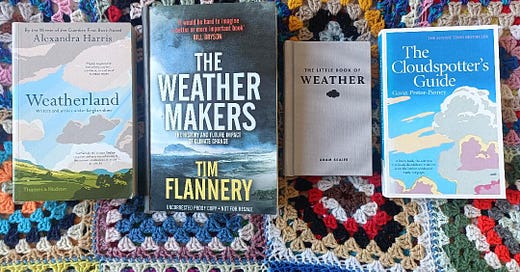The garden chairs are out but the central heating is still on. In other words, typical bank holiday weekend weather prevails here in south-west England, with chill winds, sharp showers and blazing sun all within the space of a few days. And this of course gives us something to talk about.
If you fancy reading about the weather, instead of merely talking about it: here are my suggestions:
“The Little Book of Weather” by Adam Scaife
From the I Spy series of my nerdy childhood to the Observer books I have a collection of, I have always loved a spotter’s guide. Part of a new series from Princeton University Press in this same tradition, this cutely compact book explains the basics behind atmospheric changes; as well as the effect of weather patterns including El Niño and La Niña, and Atlantic Multidecadal Variability (which creates slow, decade-long changes in European summer rainfall). I also learned that there is no truth in the saying 'lightning never strikes twice’ (it regularly does) but pleasingly, the phrase ‘red sky at night, shepherd’s delight; red sky in the morning, shepherd’s warning’ is scientifically sound.
“The Cloud-Spotter’s Guide” by Gavin Pretor-Pinney
A huge hit when it was first published in 2006, this marvellous guide to different types of cloud and the weather they herald derived from The Cloud Appreciation Society, created by Gavin Pretor-Pinney after he decided that clouds deserved better than to be regarded ‘merely as a metaphor for doom’. In the Society’s manifesto, he sets out the belief that ‘clouds are Nature’s poetry, and the most egalitarian of her displays, since everyone can have a fantastic view of them’. And indeed we can. From cumulus clouds and their associations with the divine, to contrails, ‘the neatest and nastiest of the cloud family’, this book is a treasure trove of observation that will give you a new appreciation of our endlessly entertaining skies.
“Weatherland” by Alexandra Harris
‘My subject is not the weather itself, but the weather as it is daily recreated in the human imagination ’. From a blind John Milton enjoying the warmth of the sun while sitting in his doorway, and Daniel Defoe’s account of the 1703 hurricane, to John Constable’s dramatic paintings of rain clouds and Stevie Smith’s love of damp days, this beguiling book tells the story of English culture over the past thousand years through the myriad ways in which writers and artists have been inspired by our weather. It’s an often nostalgic, Romantic story, but Alexandra Harris also reminds us that human creativity works in both directions. Weather might fire the human imagination, but increasingly it is we who create its story.
“The Weather Makers” by Tim Flannery
‘We are the generation fated to live in the most interesting of times, for we are now the weather makers’. So often - especially here in Britain - we routinely talk of our weather as a random sequences of events we have little control over. Australian environmentalist, Professor Tim Flannery begs to differ. Published in 2006, this urgent study of the history and future impact of climate change was one of the first books I read about the potentially dire consequences of our human-heated planet. Reading it again twenty years later reminds me that extreme weather events are not just the stuff of recent headlines but have been growing in intensity for decades. It’s a bracing reminder that time to tackle the climate emergency is running away with us, even faster then when this was first published.




